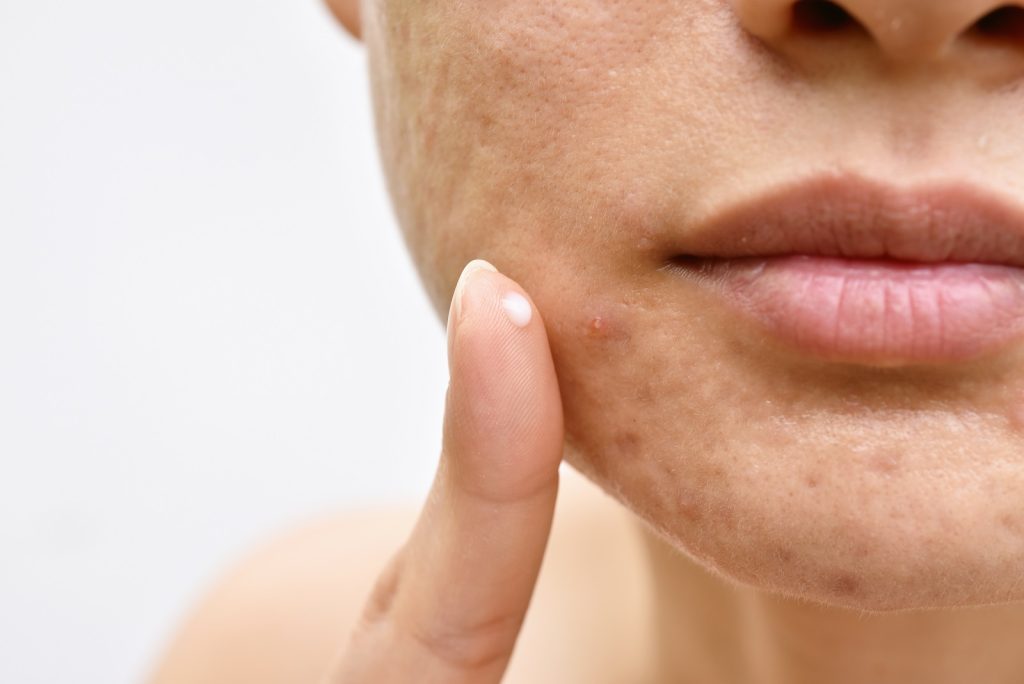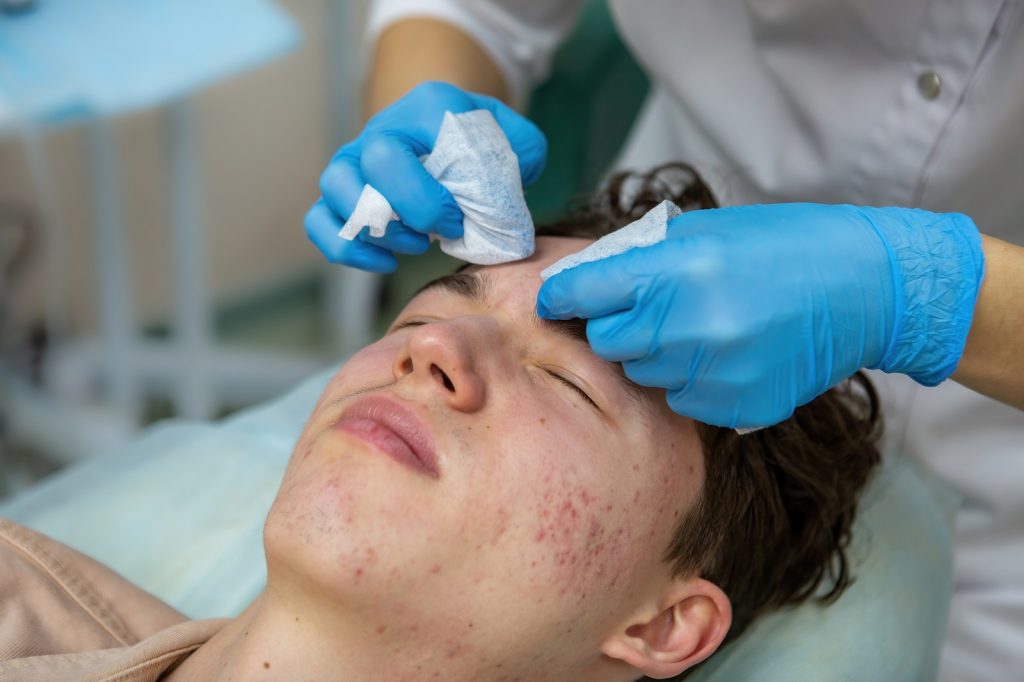Best Acne Treatments for Your Skin
Acne is a common skin condition that affects individuals of all ages, genders, and skin types. It can be frustrating, painful, and even cause scarring if left untreated. While over-the-counter (OTC) acne treatments can be effective for mild to moderate acne, some cases may require prescription medications for more severe acne.
In this comprehensive guide, we will explore the differences between OTC and prescription acne treatments, the types of prescription medications available, and how to determine the best acne treatment for your skin type. We will also debunk common myths about acne treatment and provide alternative acne treatment options.

Understanding Acne and Its Causes
Acne is a skin condition that occurs when hair follicles become clogged with oil and dead skin cells. This can lead to the formation of pimples, blackheads, whiteheads, and cysts. While acne can be caused by various factors, including genetics and hormonal changes, it is often triggered by external factors such as stress, diet, and skincare products.
It’s essential to understand the type of acne you have and its severity to determine the best treatment options. Acne can be classified into two categories: inflammatory and non-inflammatory. Inflammatory acne includes papules, pustules, nodules, and cysts, while non-inflammatory acne includes blackheads and whiteheads.
Over-The-Counter (OTC) Acne Treatments
OTC acne treatments are readily available at drugstores and supermarkets without a prescription. These treatments typically contain active ingredients such as benzoyl peroxide, salicylic acid, and alpha-hydroxy acids (AHAs) that work by unclogging pores, reducing inflammation, and killing bacteria.
Benzoyl peroxide is a common ingredient found in OTC acne treatments and is effective in treating mild to moderate acne. It works by killing bacteria and reducing inflammation. Salicylic acid is another active ingredient found in OTC acne treatments that works by exfoliating dead skin cells and unclogging pores. AHAs, such as glycolic acid, work by exfoliating the skin’s surface and promoting cell turnover.
OTC acne treatments are available in various forms, including creams, gels, cleansers, and spot treatments. It’s essential to choose a product that suits your skin type and is specifically formulated to treat your type of acne. While OTC acne treatments can be effective, they may not be suitable for severe or persistent acne.
Prescription Acne Treatments
Prescription acne treatments are stronger and more effective than OTC acne treatments and are typically prescribed by a dermatologist. Prescription acne treatments include topical and oral medications that work by reducing inflammation, unclogging pores, and killing bacteria.
Topical prescription medications include retinoids, antibiotics, and azelaic acid. Retinoids work by increasing cell turnover and preventing the formation of new comedones. Antibiotics work by killing bacteria and reducing inflammation, while azelaic acid works by reducing inflammation and unclogging pores.
Oral prescription medications include antibiotics, hormonal treatments, and isotretinoin. Antibiotics work by killing bacteria and reducing inflammation, while hormonal treatments, such as birth control pills, work by regulating hormones that can trigger acne. Isotretinoin is a powerful oral medication that is used to treat severe acne and works by reducing oil production and preventing the formation of new comedones.
Types of Prescription Acne Medications
Retinoids are a type of prescription medication that is used to treat acne. Retinoids work by increasing cell turnover and preventing the formation of new comedones. There are several types of retinoids available, including tretinoin, adapalene, and tazarotene.
Antibiotics are another type of prescription medication used to treat acne. Antibiotics work by killing bacteria and reducing inflammation. Common antibiotics used to treat acne include doxycycline, minocycline, and erythromycin.
Hormonal treatments, such as birth control pills, can also be used to treat acne in women. Hormonal treatments work by regulating hormones that can trigger acne. Isotretinoin is a powerful oral medication that is used to treat severe acne and works by reducing oil production and preventing the formation of new comedones.

How to Determine the Best Acne Treatment for Your Skin Type?
Determining the best acne treatment for your skin type requires understanding the type of acne you have and its severity. For mild to moderate acne, OTC acne treatments containing active ingredients such as benzoyl peroxide and salicylic acid may be effective. However, if your acne is severe or persistent, prescription acne treatments may be necessary.
It’s essential to consult with a dermatologist to determine the best treatment for your skin type. Dermatologists can evaluate your skin and prescribe medication tailored to your specific needs. It’s also important to follow a skincare routine that is suitable for your skin type and avoid using products that can cause irritation or further breakouts.
Tips for Effective Acne Treatment
Effective acne treatment requires a combination of medication and lifestyle changes. Here are some tips for effective acne treatment:
- Wash your face twice a day with a gentle cleanser.
- Avoid picking or popping pimples as it can cause scarring and further breakouts.
- Use non-comedogenic skincare products that won’t clog pores.
- Avoid touching your face, as it can transfer bacteria and oil to your skin.
- Manage stress levels, as stress can trigger acne.
- Follow a healthy diet that includes plenty of fruits and vegetables.
- Get enough sleep to help your skin rejuvenate.
Alternative Acne Treatments
Alternative acne treatments can be effective for mild to moderate acne and can be used in conjunction with traditional acne treatments. Here are some alternative acne treatments that you may find helpful:
- Tea tree oil: Tea tree oil contains antibacterial properties that can help reduce inflammation and kill bacteria.
- Aloe vera: Aloe vera contains anti-inflammatory properties that can help reduce redness and inflammation caused by acne.
- Zinc supplements: Zinc supplements can help reduce inflammation and oil production, which can lead to acne.
- Green tea: Green tea contains antioxidants that can help reduce inflammation and kill bacteria.
- Honey: Honey contains antibacterial properties that can help kill bacteria and reduce inflammation.
Acne is a common skin condition that can be frustrating, painful, and even cause scarring if left untreated. Understanding the best acne treatments for your skin type can be a daunting task, but with the right knowledge, you can achieve clear and healthy-looking skin. Whether you have dry, oily, or combination skin, there are numerous treatment options available, including OTC and prescription acne treatments, lifestyle changes, and alternative acne treatments. Remember to consult with a dermatologist to determine the best treatment plan for your specific needs and follow a skincare routine that is suitable for your skin type. With the right treatment and care, you can achieve a radiant complexion and say goodbye to frustrating breakouts.